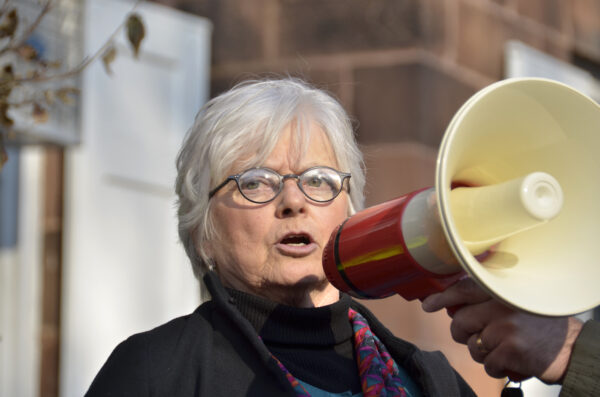Ann Dexter Gordon, a distinguished documentary editor and director of the Stanton–Anthony Papers project, died on March 19, 2025, at the age of 80.

Photo courtesy Daniel Marketti
Ann was born in Providence, Rhode Island, in 1944. She earned her BA from Smith College in 1966 and attended graduate school at the University of Wisconsin–Madison. She was involved, along with other radical student activities of those years, with the formation of the Teaching Assistants Association, the first graduate student labor union in the country. She was also editor of the Madison underground paper Connections.
Her dissertation, completed in 1975 under the direction of Stanley Katz, was titled “The College of Philadelphia, 1749–1779: Impact of an Institution.” An article based on that research, “The Young Ladies Academy of Philadelphia,” was included in Carol Berkin and Mary Beth Norton’s Women of America: A History (1979). While still a graduate student, Ann also wrote, with Mari Jo Buhle and Nancy Schrom Dye, “Women in American Society: An Historical Contribution,” one of the earliest overviews of the new field of women’s history.
After earning her PhD, Ann taught briefly in the Northwestern School of Education before joining the Jane Addams Papers Project, located at Hull House in Chicago and led by Mary Lynn McCree Bryan. This launched her into her life’s work: documentary editing. From the Addams Papers, she moved to the Woodrow Wilson Papers, where she was mentored by veteran editor Arthur Link.
In the 1970s, the National Historical Publications and Records Commission began to shift its resources from presidential papers to a wider array of historical subjects. Ann and Patricia Holland became editors in 1982 of the Elizabeth Cady Stanton–Susan B. Anthony Papers, housed in the W. E. B. Du Bois Department of Afro-American Studies at the University of Massachusetts Amherst. Collecting 14,000 documents by, to, and from Stanton and Anthony from hundreds of repositories, the papers were published in 1993 in 45 microfilm reels by Scholarly Publications.
In 1993, Ann began a second phase of the Stanton–Anthony project. After relocating the work to Rutgers University, she started a six-volume book publication, The Selected Papers of Elizabeth Cady Stanton and Susan B. Anthony (Rutgers University Press, 1997–2013). At approximately 3,000 pages, these volumes made available approximately 10 percent of the microfilm selections, carefully selected, transcribed, and annotated. As Ann wrote in 2015, together the microfilm and book projects “transformed histories of women in politics and increased attention to the ideas of its principals.” For the Selected Papers, Ann worked with and trained two dozen associate editors and editorial assistants in the highest standards of historical documentary editing. She continued to deliver talks and publish articles and blog posts, sharing her knowledge, analysis, and perspective on these women with insight and humor in equal measure.
Nor did she limit herself to scholarly interventions. Stanton and Anthony, as representatives of the long, rich, and contentious history of the American women’s rights movement, continue to be invoked for contemporary political purposes. Ann particularly challenged the misuse of quotations from their publication, The Revolution, by modern antiabortion activists, including those at the Susan B. Anthony List. Ann, working often with journalist and Anthony scholar Lynn Sherr, challenged the political appropriation of her subjects’ words and opinions on a topic that they never openly addressed and that, certainly in Stanton’s case, was completely at odds with her general approach to women’s bodily autonomy. Ann tackled another modern misuse of Susan B. Anthony’s legacy in 2020, when President Donald Trump “pardoned” her for her 1872 arrest on federal charges of illegal voting. As Ann told NPR, “Susan didn’t want a pardon. She wore her conviction as a badge of honor.”
At Rutgers, Ann remained an academic union activist. Although working there for decades, she remained an untenured research professor and fought successfully for the rights of others in that category. The heartfelt obituary from the Rutgers AAUP-AFT chapter reads: “We are a stronger, better union and university for her leadership, scholarship, service, and union activism. We stand on the shoulders of giants like Ann, and we hope to do their legacy justice.”
At times like this, when the integrity of American history in all ways is under assault, historians like Ann Gordon will be sorely missed.
Ellen Carol DuBois
University of California, Los Angeles
This work is licensed under a Creative Commons Attribution-NonCommercial-NoDerivatives 4.0 International License. Attribution must provide author name, article title, Perspectives on History, date of publication, and a link to this page. This license applies only to the article, not to text or images used here by permission.
